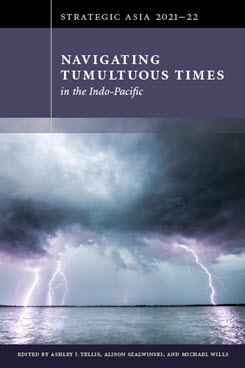Leveraging Uncertainty
India’s Response to U.S.-China Competition
This chapter contends that India has taken intensified U.S.-China competition as an opportunity to push forward in its quest to become a leading power in Asian and global affairs—a goal that mostly aligns with current U.S. interests.
EXECUTIVE SUMMARY
MAIN ARGUMENT
A shared interest in limiting China’s rise has elevated the defense and strategic partnership between Washington and New Delhi and enhanced India’s geopolitical stature as a hub of strategic coordination in the Indo-Pacific. Although the Covid-19 pandemic will depress its medium-term trajectory and exacerbate preexisting challenges, India may yet resume its robust rise with deft policymaking. India is partly pursuing this goal by trying to take advantage of risks to globalization, such as the quest for supply chain resilience among Indo-Pacific countries. Ultimately, however, India’s interests are its own and unlikely to bend significantly in the direction of U.S. interests, absent a shared threat or joint opportunity.
POLICY IMPLICATIONS
- Washington can expect India’s support in U.S.-China competition, but India will also leverage the current situation to achieve its national interests, which will occasionally clash with those of the U.S. This should not be cause for U.S.-India discord but rather the basis for managing expectations.
- The pandemic will delay but not derail India’s rise if the government can devise a mix of long-term policies focused on growth, employment, and human development. To this end, the U.S. can further develop partnerships in India’s health sector.
- India’s efforts at economic self-reliance are an opportunity for the U.S. and its allies to diversify supply chains in the Indo-Pacific. Investing in India’s long-term potential to become a manufacturing powerhouse can only benefit countries looking to reduce their dependence on China.
Rohan Mukherjee is an Assistant Professor of Political Science at Yale-NUS College in Singapore.



